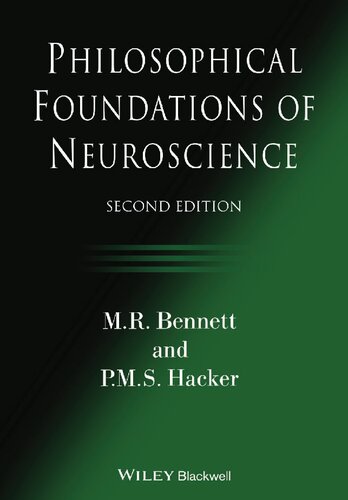(EBOOK PDF)Philosophical Foundations of Neuroscience 2nd Edition by M R Bennett 9781119530633 1119530636 full chapters
$50.00 Original price was: $50.00.$35.00Current price is: $35.00.
Philosophical Foundations of Neuroscience 2nd Edition by M R Bennett – Ebook PDF Instant Download/Delivery: 9781119530633, 1119530636
Full download Philosophical Foundations of Neuroscience 2nd Edition after payment

Product details:
• ISBN 10:1119530636
• ISBN 13:9781119530633
• Author:M R Bennett
Philosophical Foundations of Neuroscience
The second edition of the seminal work in the field–revised, updated, and extended
In Philosophical Foundations of Neuroscience, M.R. Bennett and P.M.S. Hacker outline and address the conceptual confusions encountered in various neuroscientific and psychological theories. The result of a collaboration between an esteemed philosopher and a distinguished neuroscientist, this remarkable volume presents an interdisciplinary critique of many of the neuroscientific and psychological foundations of modern cognitive neuroscience. The authors point out conceptual entanglements in a broad range of major neuroscientific and psychological theories–including those of such neuroscientists as Blakemore, Crick, Damasio, Dehaene, Edelman, Gazzaniga, Kandel, Kosslyn, LeDoux, Libet, Penrose, Posner, Raichle and Tononi, as well as psychologists such as Baar, Frith, Glynn, Gregory, William James, Weiskrantz, and biologists such as Dawkins, Humphreys, and Young. Confusions arising from the work of philosophers such as Dennett, Chalmers, Churchland, Nagel and Searle are subjected to detailed criticism. These criticisms are complemented by constructive analyses of the major cognitive, cogitative, emotional and volitional attributes that lie at the heart of cognitive neuroscientific research.
Now in its second edition, this groundbreaking work has been exhaustively revised and updated to address current issues and critiques. New discussions offer insight into functional magnetic resonance imaging (fMRI), the notions of information and representation, conflict monitoring and the executive, minimal states of consciousness, integrated information theory and global workspace theory. The authors also reply to criticisms of the fundamental arguments posed in the first edition, defending their conclusions regarding mereological fallacy, the necessity of distinguishing between empirical and conceptual questions, the mind-body problem, and more. Essential as both a comprehensive reference work and as an up-to-date critical review of cognitive neuroscience, this landmark volume:
Provides a scientifically and philosophically informed survey of the conceptual problems in a wide variety of neuroscientific theories
Offers a clear and accessible presentation of the subject, minimizing the use of complex philosophical and scientific jargon
Discusses how the ways the brain relates to the mind affect the intelligibility of neuroscientific research
Includes fresh insights on mind-body and mind-brain relations, and on the relation between the notion of person and human being
Features more than 100 new pages and a wealth of additional diagrams, charts, and tables
Continuing to challenge and educate readers like no other book on the subject, the second edition of Philosophical Foundations of Neuroscience is required reading not only for neuroscientists, psychologists, and philosophers, but also for academics, researchers, and students involved in the study of the mind and consciousness.
Philosophical Foundations of Neuroscience 2nd Table of contents:
Introduction to the First Edition
Introduction to the Second Edition
Part I Philosophical Problems in Neuroscience: Their Historical and Conceptual Roots
Preliminaries to Part I
1 Philosophical Problems in Neuroscience: Their Historical Roots
2 Philosophical Problems in Neuroscience: Their Conceptual Roots
1 The Growth of Neuroscientific Knowledge: The Integrative Action of the Nervous System
1.1 Aristotle, Galen and Nemesius: The Origins of the Ventricular Doctrine
1.2 Fernel and Descartes: The Demise of the Ventricular Doctrine
1.3 The Cortical Doctrine of Willis and Its Aftermath
1.4 The Concept of a Reflex: Bell, Magendie and Marshall Hall
1.5 Localizing Function in the Cortex: Broca, Fritsch and Hitzig
1.6 The Integrative Action of the Nervous System: Sherrington
1.6.1 The dependence of psychological capacities on the functioning of cortex: localization determined non-invasively by Ogawa and Sokolof
1.6.2 Caveats concerning the use of fMRI to determine the areas of cortex involved in supporting psychological powers
2 The Growth of Neuroscientific Knowledge: The Integrative Action of the Nervous System
2.1 Charles Sherrington: The Continuing Cartesian Impact
2.2 Edgar Adrian: Hesitant Cartesianism
2.3 John Eccles and the ‘Liaison Brain’
2.4 Wilder Penfield and the ‘Highest Brain Mechanism’
3 The Mereological Fallacy in Neuroscience
3.1 Mereological Confusions in Cognitive Neuroscience
3.2 Challenging the Consensus: The Brain Is Not the Subject of Psychological Attributes
3.3 Qualms Concerning Ascription of a Mereological Fallacy to Neuroscience
3.4 Replies to Objections
4 An Overview of the Conceptual Field of Cognitive Neuroscience: Evidence, the Inner, Introspection, Privileged Access, Privacy and Subjectivity
4.1 On the Grounds for Ascribing Psychological Predicates to a Being
4.2 On the Grounds for Misascribing Psychological Predicates to an Inner Entity
4.3 The Inner
4.4 Introspection
4.5 Privileged Access: Direct and Indirect
4.6 Privacy or Subjectivity
4.7 The Meaning of Psychological Predicates: How They Are Explained and Learned
4.8 Of the Mind and Its Nature
Part II Human Faculties and Contemporary Neuroscience: An Analysis
Preliminaries to Part II
1 Brain–Body Dualism (Searle)
2 The Project
3 The Category of the Psychological
5 Sensation and Perception
5.1 Sensation
5.2 Perception
5.2.1 Perception as the causation of sensations: primary and secondary qualities
5.2.2 Perception as hypothesis formation: Helmholtz
5.2.3 Visual images and the binding problem
5.2.4 Perception as information processing: Marr’ s theory of vision
6 The Cognitive Powers
6.1 Knowledge and Its Kinship with Ability
6.1.2 Possessing knowledge and containing knowledge
6.2 Memory
6.2.1 Declarative and non-declarative memory
6.2.2 Storage, retention and memory traces
7 The Cogitative Powers
7.1 Belief
7.2 Thinking
7.3 Imagination and Mental Images
7.3.1 The logical features of mental imagery
8 Emotion
8.1 Affections
8.2 The Emotions: A Preliminary Analytical Survey
8.2.1 Neuroscientists’ confusions
8.2.2 Analysis of the emotions
9 Volition and Voluntary Movement
9.1 Volition
9.2 Libet’s Theory of Voluntary Movement and Its Progeny
9.3 Refutations and Clarifications
9.4 Conflict-Monitoring and the Executive
9.5 Man and Machine: Doing Something Like an Automaton, Automatically, Mechanically, from Force of Habit
9.6 Taking Stock
Part III Consciousness and Contemporary Neuroscience: An Analysis
10 Intransitive and Transitive Consciousness
10.1 Consciousness and the Brain
10.2 Intransitive Consciousness and Awareness
10.2.1 Minimal states of consciousness or responsiveness
10.3 Transitive Consciousness and Its Forms
10.3.1 A partial analysis
11 Conscious Experience, Mental States and Qualia, Neural Correlates of Consciousness
11.1 Extending the Concept of Consciousness
11.2 Conscious Experience and Conscious Mental States
11.2.1 Confusions regarding unconscious belief and unconscious activities of the brain
11.3 Qualia
11.3.1 ‘How it feels’ to have an experience
11.3.2 Of there being something which it is like …
11.3.3 The qualitative character of experience
11.3.4 Thises and thuses
11.3.5 Of the communicability and describability of qualia
12 Neural Correlates of Consciousness, Integrated Information Theory, Global Workspace Theory
12.1 The Integrated Information Theory of Tononi
12.1.1 Axiomatizing Integrated Information Theory
12.1.2 The ambiguity of ‘information’
12.1.3 Unclarities about experience again
12.2 Global Workspace Theory
12.2.1 Analysis of Dehaene’s example
12.2.2 On Dehaene’s misconceptions of consciousness and information processing
12.3 On Finding One’s Way through a Conceptual Jungle with Worthless Tools
12.4 What Is Necessary for Neural Correlation
12.5 Where to Find the Explanations
13 Puzzles about Consciousness
13.1 A Budget of Puzzles
13.2 On Reconciling Consciousness or Subjectivity with Our Conception of an Objective Reality
13.3 On the Question of How Physical Processes Can Give Rise to Conscious Experience
13.4 Of the Evolutionary Value of Consciousness
13.5 The Problem of Awareness
13.6 Other Minds and Other Animals
14 Self-Consciousness and Selves, Thought and Language
14.1 Self-Consciousness and the Self
14.2 Historical Stage Setting: Descartes, Locke, Hume and James
14.3 Current Scientific and Neuroscientific Reflections on the Nature of Self-Consciousness
14.4 The Illusion of a ‘Self’
14.5 The Horizon of Thought, Will and Affection
14.5.1 Thought and language
14.6 Self-Consciousness
15 Concepts, Thinking and Speaking
15.1 Concepts and Concept Possession
15.1.1 Beginning again
15.2 Concept Possession as Mastery of the Use of an Expression
15.3 What Do We Think In?
Part IV On Method
16 Reductionism
16.1 Ontological and Explanatory Reductionism
16.2 Reduction by Elimination
16.2.1 Are our ordinary psychological concepts theoretical?
16.2.2 Are everyday generalizations about human psychology laws of a theory?
16.2.3 Eliminating all that is human
16.2.4 Sawing off the branch on which one sits
17 Methodological Reflections
17.1 Linguistic Inertia and Conceptual Innovation
17.2 The ‘Poverty of English’ Argument
17.3 From Nonsense to Sense: The Proper Description of the Results of Commissurotomy
17.3.1 The case of blindsight: misdescription and illusory explanation
17.4 Philosophy and Neuroscience
17.4.1 What philosophy can and what it cannot do
17.4.2 What neuroscience can and what it cannot do
17.5 Why It Matters
Appendices
Appendix 1 Daniel Dennett
1 Dennett’ s Methodology and Presuppositions
2 The Intentional Stance
3 Heterophenomenological Method
4 Consciousness
Appendix 2 John Searle
1 Philosophy and Science
2 Searle’ s Philosophy of Mind
3 Unified Field Theory
4 The Traditional Mind–Body Problem
Appendix 3 Further Replies to Critics
1 The Mereological Principle
2 Essentialism
3 A Priorism: Empirical Learning Theory or the Nature of Primitive Language-Games
4 Criteria and Constitutive Evidence
5 Foundationalism, Linguistic Conservatism, Conceptual Change, Connective Analysis, Tolerating Inconsistencies and Post-Modernism
Afterword to the Second Edition by Anthony Kenny
Index
End User License Agreement
People also search for Philosophical Foundations of Neuroscience 2nd:
philosophical foundations of neuroscience
philosophical foundations of neuroscience pdf
philosophical foundations of neuroscience 2nd edition
philosophical foundations of neuroscience review
philosophical foundations of law and neuroscience
Tags:
M R Bennett,Foundations of Neuroscience,Philosophical Foundations


